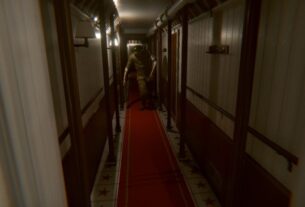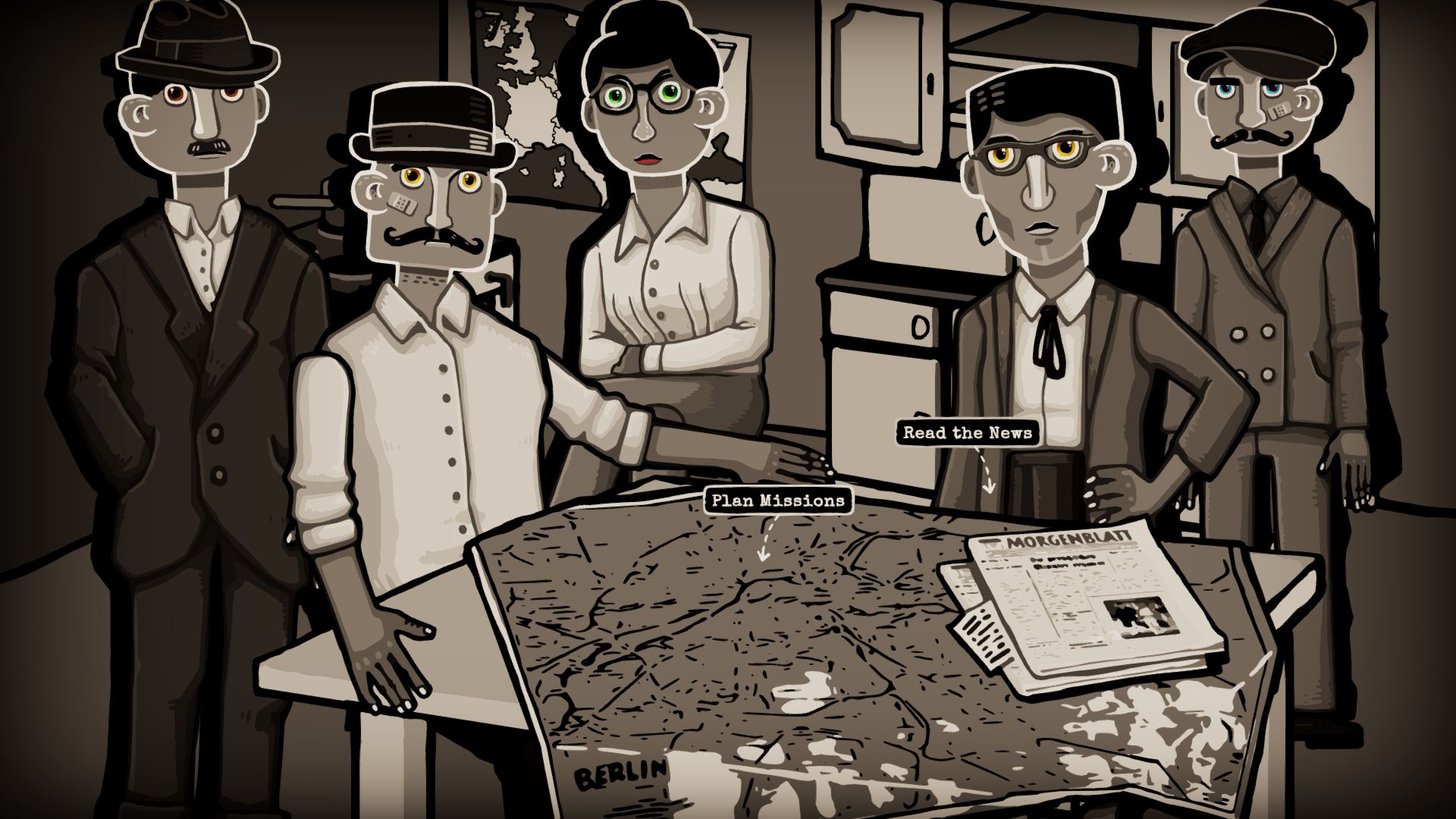
What is it? The story of Nazi Germany, as experience by a fictional group of its citizens.
Expect to pay $15/£13.49
Developer Paintbucket Games
Publisher HandyGames
Reviewed on GeForce GTX 1650, AMD Ryzen 5 3550H, 8 GB RAM
Multiplayer? No
Link Official site
No matter how intelligent or empathetic you are, it’s incredibly difficult—arguably impossible—to truly comprehend the enormity of the atrocities of Nazi Germany. Games usually seek to loosen your grip on the concept further, by saying little more than “go shoot every German you find in the face”. This pigeonhole-defying game, while still failing to communicate the scale, opens your eyes wider in a very impressive way. It is, really, more an emotional journey than anything else.
You and your small band of resistance members are German citizens; names, attributes, and appearances randomly generated. The story begins with Hindenburg appointing Hitler Chancellor in 1933, and runs right through until the aftermath of the war in 1946. The story is firmly grounded in reality, so there’s no chance of preventing WWII or having any effect at all on historical events. It’s all about doing what little you can for the persecuted, trying to spread the truth of what the Nazis are doing… and looking on helplessly as huge amounts of the populace cheer Hitler on.
Each turn represents a week, and you need to decide which tasks to assign to each of your members. Success in each is determined, in part, by the total value of the relevant attributes offered by the characters you assign (e.g. Secrecy, Strength, Propaganda). Things aren’t nearly as simple as that though, and not only because bringing certain items along can make things slightly easier or harder.
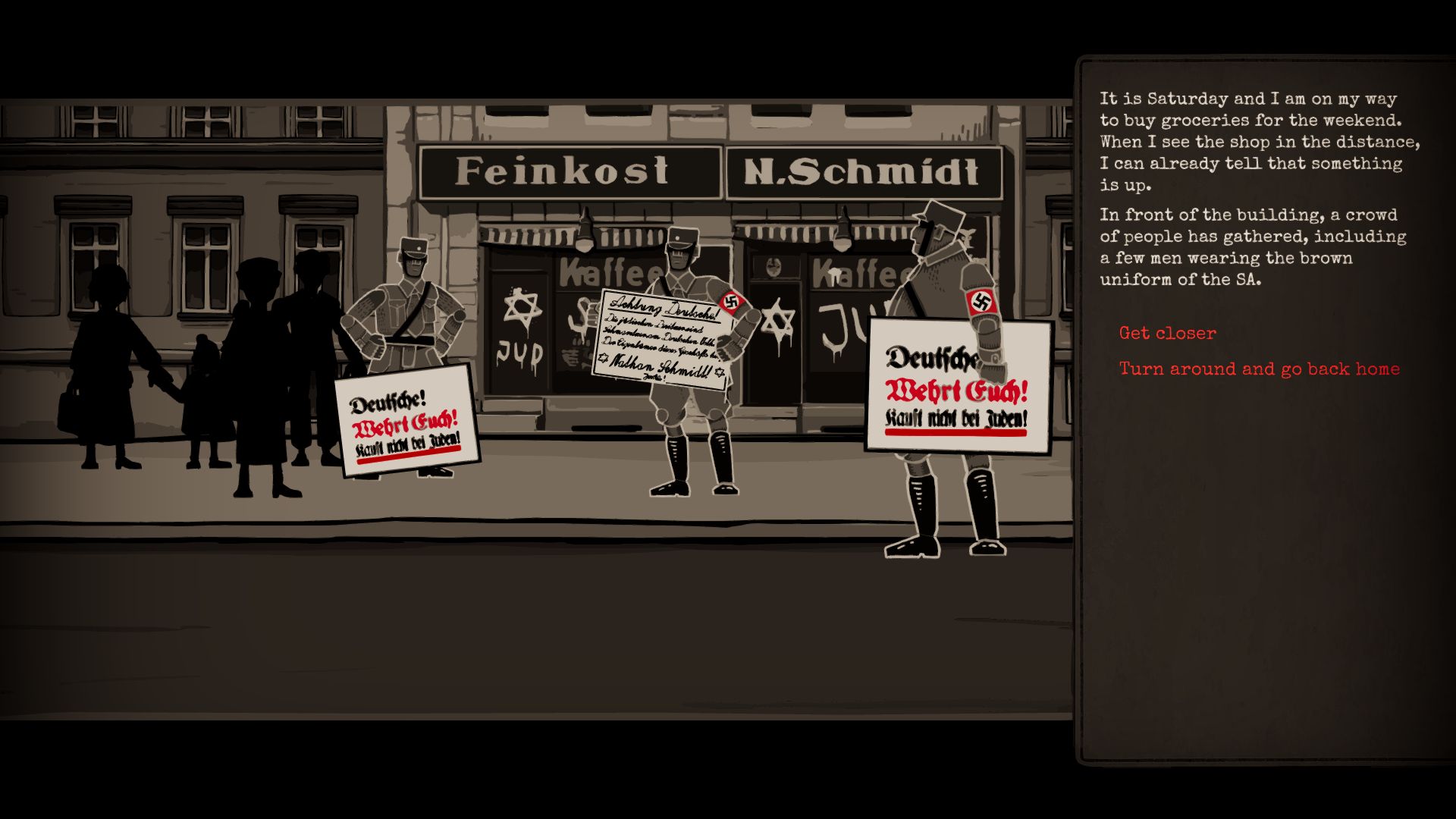
At the beginning of each week, I’m presented with three newspaper headlines. The news is historically accurate, and ordinarily details successes of some kind for the Nazi regime. My group’s morale is reduced accordingly before I’ve even done anything, and I know that I’m almost certainly due for a little more morale reduction at the end of the turn unless I get some wins for the group.
Arrested development
That’s not all. Even if an action is successful, there’s a high chance that at least one member will start to gain the attention of the authorities. If I leave this unchecked, the Gestapo will arrest them, taking them out of action. Any heat on any members assigned to a task starts to increase the risk of failure. I need to select tasks to keep my ever-depleting supply of supporters up, too. If I lose too many supporters, or group morale hits zero, it’s all over.
The mechanics are solid, and ultimately stat-based, but they melt into the background thanks to the storytelling. Although there are occasional stumbles with the text (seemingly translation problems), and the stylised art and swift pace prevent emotional bonding with any single character, I find that something cold runs through my chest at regular intervals. Paintbucket Games refuses to flinch from the realities of life in Nazi Germany, and it’s the uncomfortable complexity of the situation that really gutpunches me.
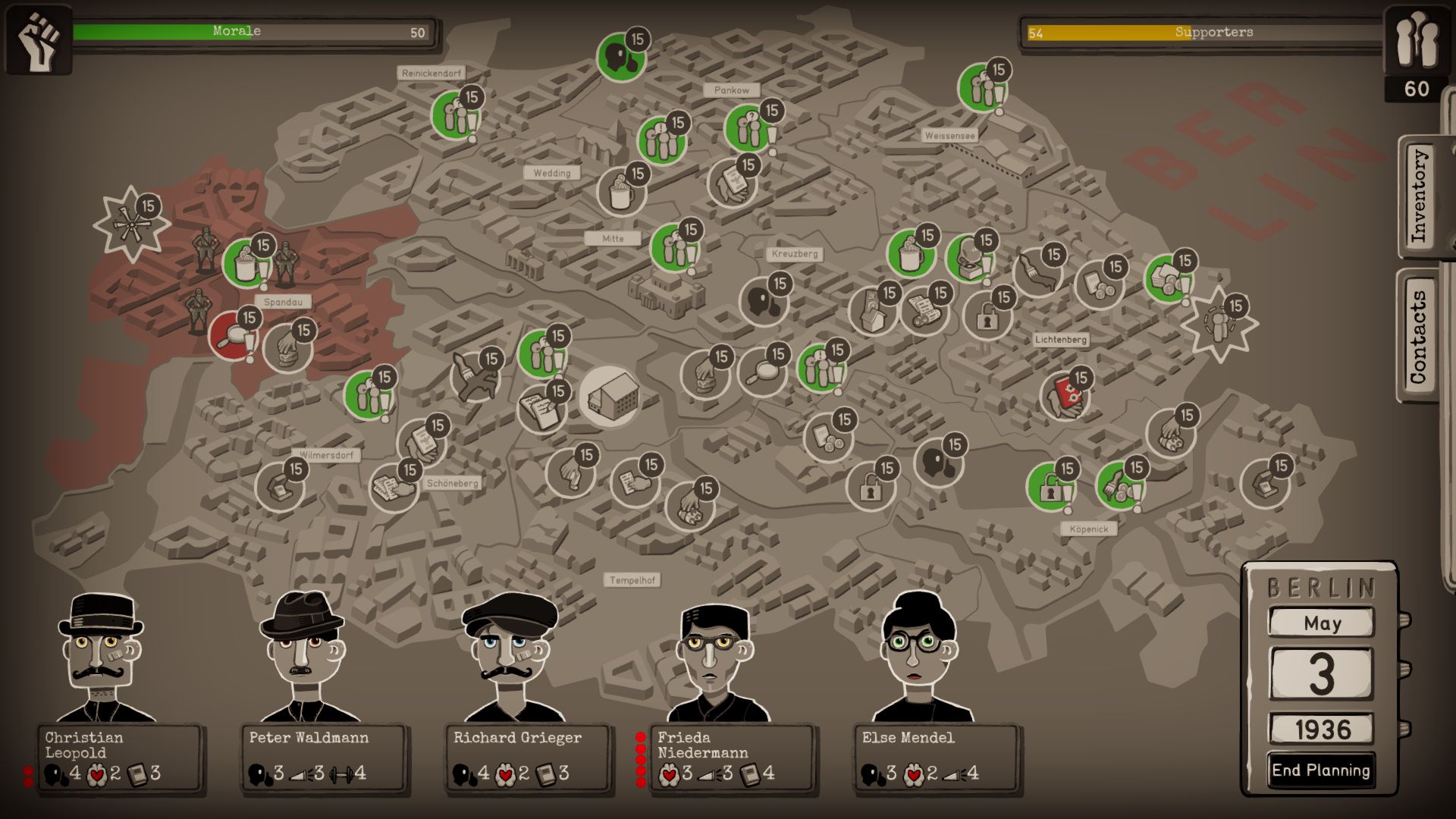
Friends, neighbours, even children; nobody around me can be guaranteed immune to the toxic charms of the charismatic Hitler and his all-powerful party. Most of these supporters of fascism, rather than being cartoonish villains, are otherwise unremarkable and… nice. They bake cakes. Host parties. Talk to me politely. There are vocal and angry critics of the Nazi regime, but they risk not only arguments with their peers, but the potentially deadly wrath of the authorities. I need to watch what I do and say.
The steady drip-drip-drip of Nazi horrors through newspaper headlines pierces me with cold reality again and again.
When I come across strangers, I don’t know whether I can trust them or not. How could I? Even when I find somebody that seems to offer a ray of hope—somebody that one way or another promises help from the outside world—little or nothing tends to come of it. Yet I’m emotionally invested enough to try my best. Early on, I come across a Jewish man being beaten by members of the SA. There’s an option to ignore the situation but, even on a second playthrough, there’s absolutely no way I can bring myself to do that.
Paper view
The first time around, it’s all extremely powerful. The steady drip-drip-drip of Nazi horrors through newspaper headlines pierces me with cold reality again and again, while seeing people suffering in the story sequences urges me on to do whatever I can during turns on the map. A second playthrough however shows that the story is rigid, and the choices I make there often have little or no effect. I soon begin to skip huge swathes of text, and the emotional impact is reduced to a fraction of what it was.
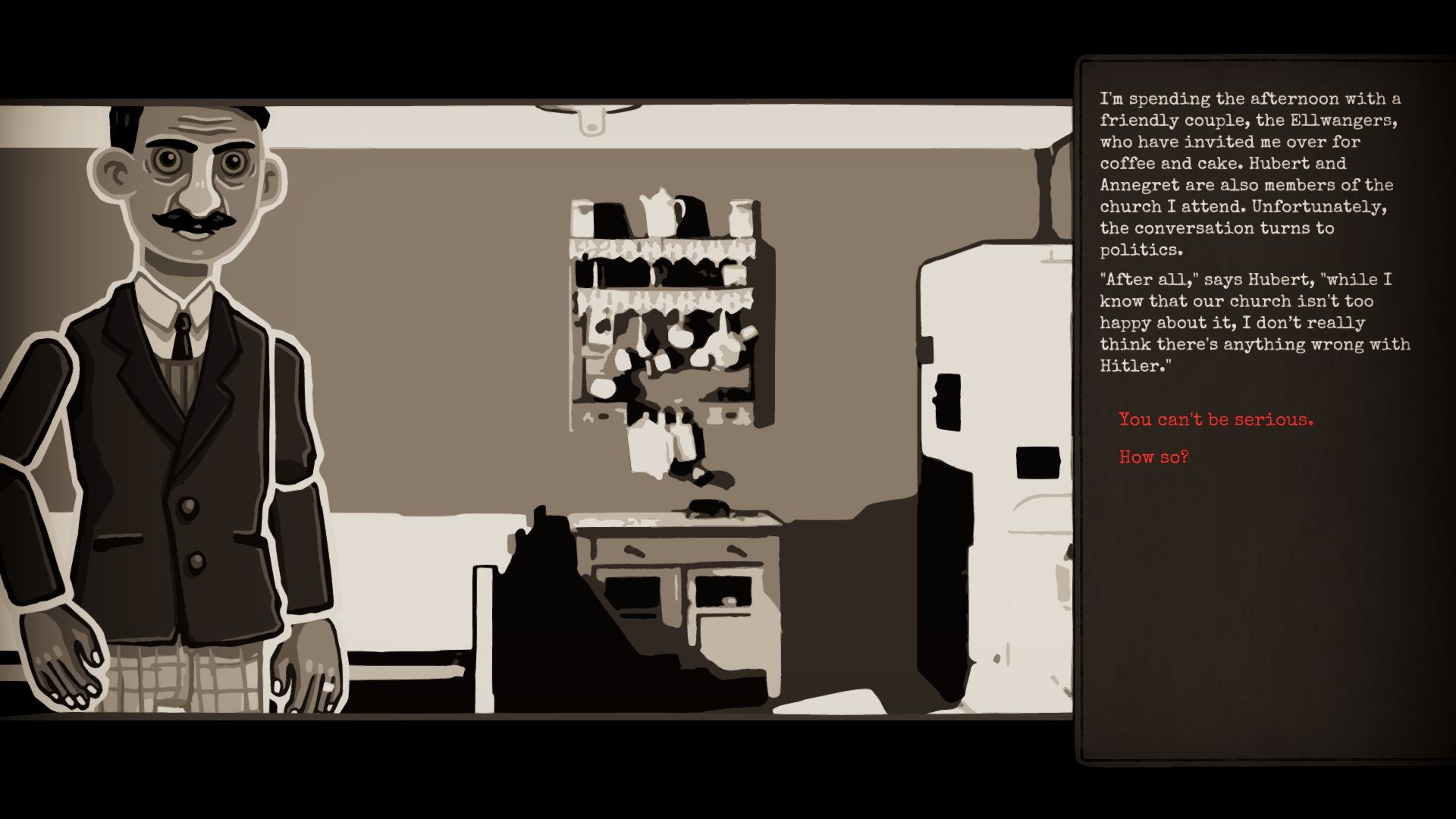
There are a few rare occasions where the wording of the script strongly references Trump, and I really wish the developers hadn’t done this. Partly because it sends cracks shooting through the atmosphere, but largely because it really isn’t necessary. At times, the parallels are so strong, you would have to cover your eyes not to see them.
Each chapter has a few major blows to the Nazis available; getting a message out to the world, say, or a major act of sabotage. These require specific items which, in turn, require specific sequences of tasks to be successfully completed (and all this within a strictly set number of turns). I’m never able to complete any of these tasks, and I’m still not sure whether this is due to design or my own poor time management. Ultimately, it doesn’t matter, because the message is the same. Small acts of rebellion under fascism are difficult and dangerous; spectacular acts of rebellion a hundred times more so.
Through the Darkest of Times is as dark as it is important. One side of the game explicitly tells the final chapter in Hitler’s rise and fall, from the perspective of ordinary citizens trying to navigate the repulsive views of their friends and inconceivably horrific rumours regarding the regime. The other side forces you to juggle the urge for action with the need to care for your group, with no easy answers. It forms a cohesive, uncomfortable whole.
Read our review policy
A superbly crafted game that serves as storyteller, teacher, and concerned friend.


